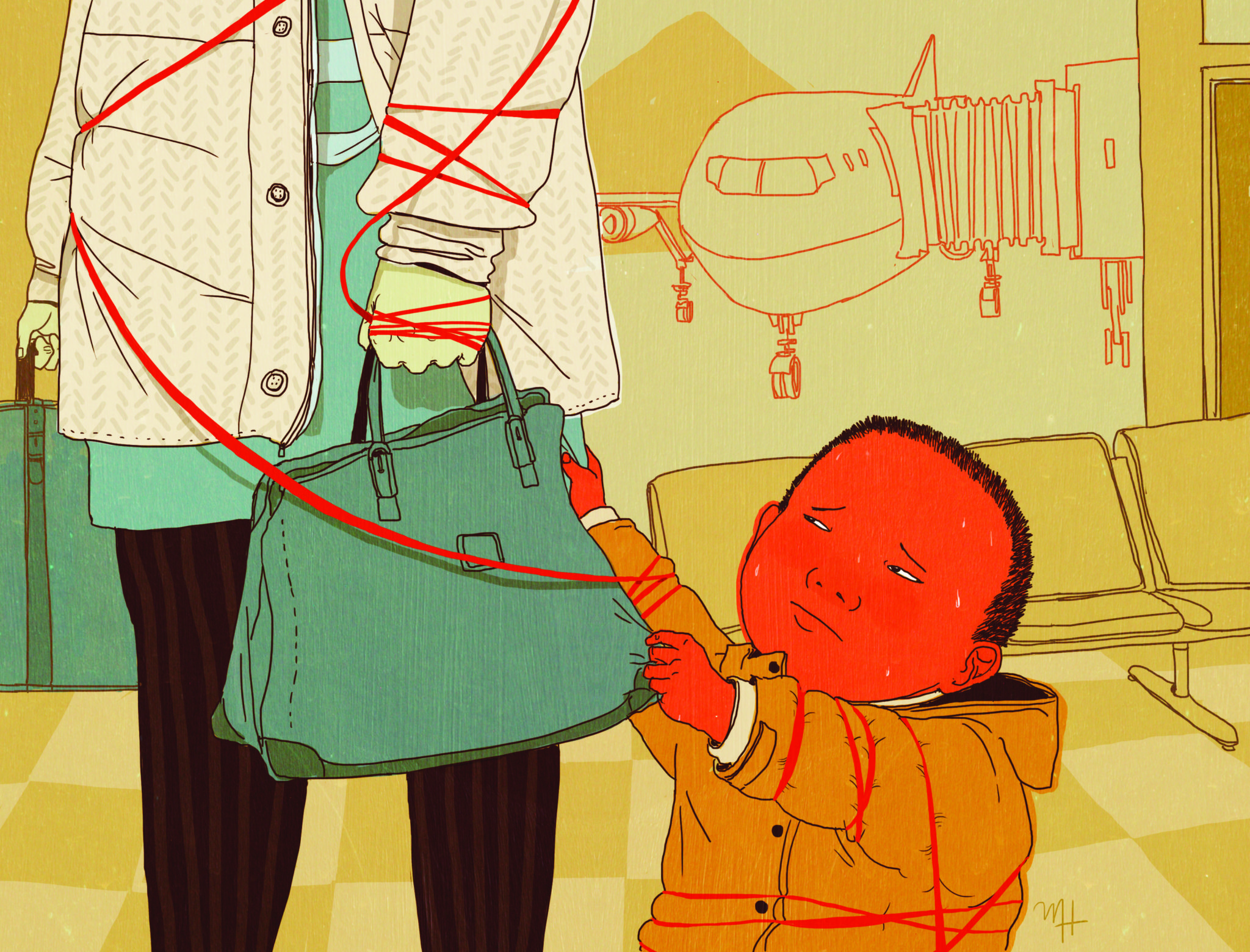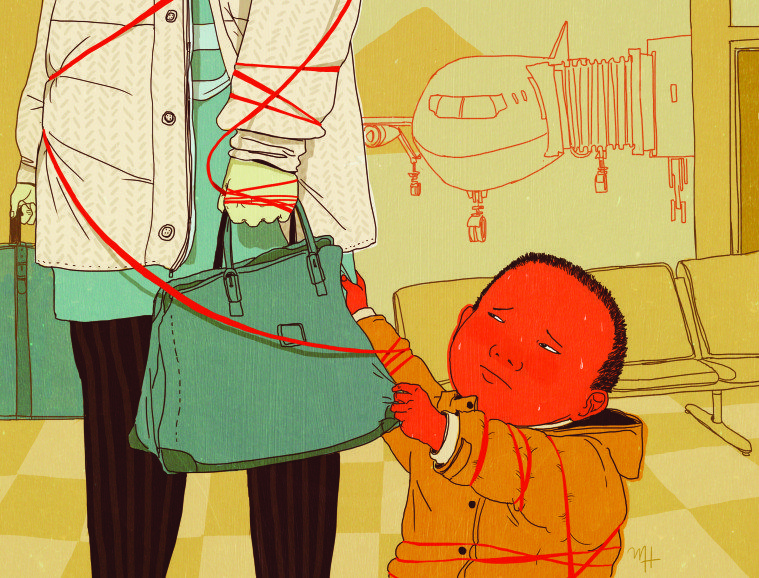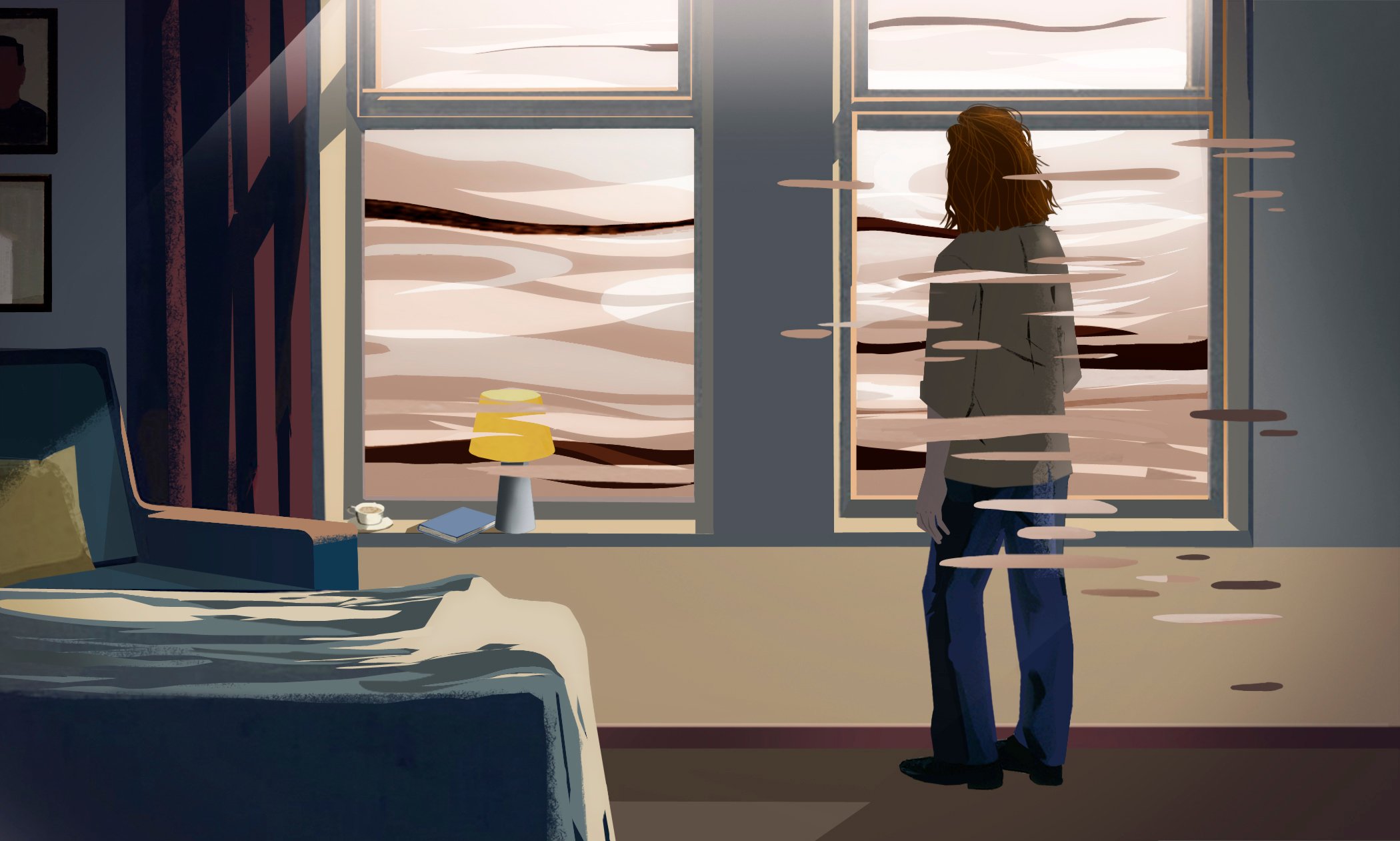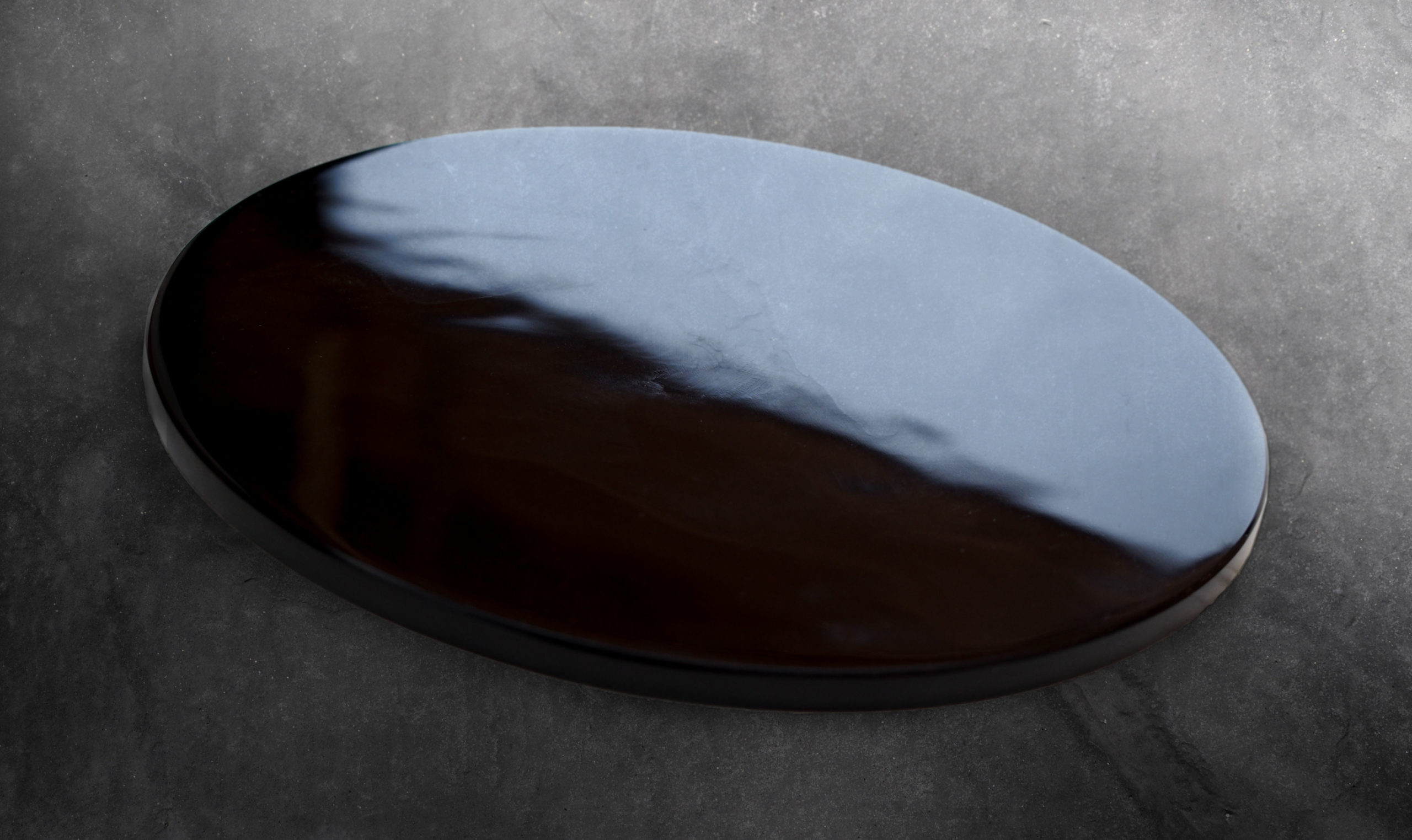
Fifth Annual Short Story Contest Winner: ‘Three Phone Calls’
A version of this story ran in the October 2015 issue.

In the blog post announcing the opening of our fifth annual Short Story Contest, we reminded readers that last year’s winning story, Ling Ma’s “Fuzhou Nighttime Feeling,” is set in China, and we issued a challenge of sorts: “Bring the trophy back home,” we wrote, “or take it even further afield.”
In a way, this year’s contest winner, Simon Han, accepted all parts of that challenge with “Three Phone Calls,” a story that takes place in both China and the United States and, stylistically, is very far afield from convention.
We hope you enjoy “Three Phone Calls” as much as guest judge Stephen Graham Jones did. After the story, you’ll find a response from Jones, a brief explication from Han, and a list of the contest’s finalists and honorable mentions.
1.
Oh? I don’t remember I said it, but it’s true. You cried on the whole flight to America. I was a young mother and your dad was already one year in Houston, and when we left China it was freezing cold, and we never lived in an environment which had air conditioning.
Heating? Yes, I mean heating. So we always had the habit of wearing a sweater indoors. And your grandparents — you know we were living with your dad’s parents — always ask this, ask that, think I will get you sick. So I put on you an underneath shirt with two layers of sweaters.
We were going so far away, and your grandparents felt like I was going to lose you. You know the xuèyuán hóngxiàn? Red thread that connects all family? Can be stretched and tangled, but can’t break. It’s not me, it’s your grandma, was saying to me she has future thought, Thread will break. She was saying, “Oh, you might fall asleep, but the baby may not sleep…”
So she took some cloth and made a leash! Oh, you have to write this. This leash can wrap around your body, and on the other side there’s something I hold on to. She and your grandpa watch us walk around with that when we board the bus, make sure I don’t take it off until we get to America, or thread breaks. You’re like a little dog. Quiet and listening to me. Not crying yet.
Yes, we walked around with the leash at the Beijing airport, and on the plane. When you sit on my lap I wrapped the end around my hand so much times. It’s very tight, I can’t feel my hand.
I think after we are in the air, you cried.
I remember so clearly now. I wore a green-and-blue-striped sweater. You wore a blue máoyī, another sweater under it, and the miánkù. I don’t know how to explain. Like ski pants. The pinyin is m-i-a-n-k-u.
Cotton? Yes, but more than a single layer.
Okay, cotton-padded trousers, but that’s not exact. Hold on, I have a picture! After your brother finishes his SAT study, I will tell him to take a picture of the picture, send you a picture.
No, it’s not crying crying. Like kun-kun-kun, huhhn-huhhn-huhhn, always moving around, kicking me.
No, I don’t know if people around me noticed. Didn’t even pay attention.
Of course, first time I see so much Lǎo Měi.
Oh, yes, we had same row seat as a friend’s family. They had a boy, too, but older I think, because he has his own seat, not like you. Because I speak English, the family, they don’t speak English, and the family’s dad was in the same school as your dad, so that’s why they said, “Let’s come together” — so I can help them with English.
No, I don’t know them now. I don’t know their voice even. Only when I talked to you now did I realize we were sitting with them, that we were not alone.
Oh, yes, everything was new. I think the meal was sooo wonderful. So many options. There is four or five little boxes in the tray, and in each box they have an option, but you can have all the options. It all smells so fresh. Like they catch the fish from the clouds. I wonder if they have a kitchen in the back of the plane.
Yes, I’m sure. You’re a boy, you never cried loudly. Not shouting, yelling kind of cry. Quiet crying, but crying.
Of course, I still finished the food. You are crying, not me.
When I finally got off and arrived in the airport in Japan, I took off your leash and said go stand in front of the window, so I can see the plane and you. Do you remember the picture of you in Japan with the big orange overcoat over the sweaters, and your face was super red? When I looked through the camera, I realized you were red.
It’s because I saw people walking out from the plane, walking like astronaut, and they stare at you, like they realized you are red, that’s why. They stared at me like your grandma. And after that I am so hot behind the camera, my sweater is sooo itchy. And maybe I am red, too. I saw you standing by the window, your little head on top of all the clothes. I quickly took off your sweaters, and oh! You started running around, happy.
Of course, I saw your face on the plane. But I didn’t know you were sweating. I’m a young mother, how do I know these things? Did you get your brother’s text?
No, it wasn’t that long. It was only China to Japan you were crying, not Houston.
Just one leg of the flight. Four hours. I wouldn’t make that mistake with your clothes on both flights I’m not that stupid, right?
Tired, yes. But it’s not the same.
So what are you doing? You write about yourself, or you write about me?
Say I was a young mother, Harrison. Say typically you are taken care of by grandparents — I’d barely taken care of you myself. I was never left alone with you. I think I did a good job.
But I can still see so clearly, more clearly than the picture. You were so red. It never occurred to me that you were so red, that the plane already has air conditioning.
2.
Yeah, Harry. I read your story. I have… things to say. I was going to email you after case law.
Well, I get why it took you eight years to finish a draft. Jesus.
It was a nice story. I thought the imagery was very pleasant — all the, let me look for it… uh, yeah, the description of the clouds. Seeing the “tops of clouds” and the “shadows of clouds” on the grass. Something about shadows like “dark lakes?” And the “pumpkin-tinted light.” It was pretty. I was getting lost in Mom’s mind. Okay, more spooky than pretty. What’s that she used to say? How she saw colors more deeply than we did?
Okay, the mother’s mind. But come on. Harry.
What? I did like the cloud descriptions.
Look, I got an exam tomorrow.
Fine. You really want to know? Brother to brother and all that?
No. I did not.
Did I say it was boring? You really think I would say that about this? I mean the moment, the journey, is sweet. I don’t have this amazing plane ride to remember Mom by, but… you know what? Maybe your story is boring. Maybe it’s worse.
I mean, I read the fine print. That’s what I do.
Okay — okay. It’s that fucking leash!
You introduce that leash, and the grandparents’ fear of Mom — the young mother, the tired mother — losing the child without the leash. The whole “You must keep the leash on our sūnzi until you arrive in America” thing. And what happens? Before she takes her son’s picture in the terminal, before she realizes her son is red as tomatoes, before she sheds his four — four! — sweaters and he’s prancing around like he’s in a cruise ship musical, she “removes his leash.” He’s unleashed!
And you’re worried about writing something boring. How about you write me something true?
There’s a reason you keep trying to finish this story, right?
Even this draft just… ends.
I don’t know. Am I supposed to believe that that’s all there is? Just because I can’t ask Mom, am I supposed to believe you?
3.
No, Harrison, I do not have a photo. Your mother was so tired after the flight from Japan, I think she did not know if she was in Houston or a dream.
You looked normal. Big head, chubby cheeks, like Jenny. How is my granddaughter? Is she there?
Okay, make sure she is wearing enough clothes.
Oh, you? Probably a sweater, jacket, something like that. Yellow — bright yellow. In all our photographs in Houston, you are wearing clothes from China, and they are all bright, that was the fashion thirty-five years ago. But you know this, it’s in your book. The fashion.
Of course, Japan to Houston is a great distance.
I am not sure I understand.
No, you were very close to your mother at the airport. I remember you were always holding her arm — not her hand, but her arm. But your fingers were too small and chubby, and they kept slipping, slipping. On the drive back, your mother sat with you in the backseat, still holding you. Your poor father, I was more like the taxi driver.
Huh?
No, I do not remember any leash. What are you, a dog?
Enough, Harrison. You were a good kid, not like your brother. We did not have to worry about you. You liked being around us. Always watching us, learning, asking us questions — even more when you started writing. You know what your brother told me when your book came out?
He said you would always know your mother better than him. Because you are a writer.
You are being too harsh. The important thing is, you did ask questions while she was alive. It does not matter why you asked them. You asked them, you learned.
What kind of question is that?
No, that’s ridiculous. She would tell me if she lost you in Japan — she would tell me.
Let me tell you something that actually happened. You were a baby, and when you saw me at the airport, you turned quiet, shy, like with a Lǎo Měi. And when I tried to take you from your mother, you cried. You cried so hard and you would not stop — you cried the whole drive home. I thought maybe I had the wrong child. Maybe my boy grew up faster in the year I was in America, maybe my boy was Dai Chen’s boy, who had been standing next to a stranger boy in the airport. Maybe in the airport, I picked the wrong boy.
Dai Chen was my friend from college, his family was on the plane with you. See, you don’t remember that. You cannot remember how tired your mother was, how much you held on to her, your short, chubby fingers, grabbing for the only person who could understand your words. Nothing happened. That is why she was a good mother.
But no, that is what people will think you are saying. Even the other day, Larry, you remember from my office? He actually read your book — the whole thing! And he told me that he could not believe I survived all that stuff in China. I said can or cannot believe?
I don’t care if it’s not real. Did you already write this story about the flight?
Enough, Harrison. Nobody in this world remembers it like that.
Maybe you cannot finish the story because there is not enough there to make it a story. So that is why you want to put a leash in it. Some ugly image of a tired mother dragging her son. And if she takes off the leash before she sleeps and wakes up to no baby, drama! The uglier the drama, the better. I do not mean to discourage you.
Of course I know what ugly means.
Something that I want to look away from. Something I do not want to imagine.
Maybe we are using different dictionaries, Harrison.
The initial constraint with writing any short story, it’s right there in the name: it’s short. You don’t have much space to work with, yet you’ve still got to create a world, a life, and make us engage it. “Three Phone Calls” does that with room to spare. First it takes away the “center,” the protagonist — possibly the narrator — and that leaves us with the task of then piecing that character together from the broken pieces we can salvage. More than that, though, “Three Phone Calls” glances off just enough events “outside” the scope of the story that it activates our impulse to see faces in wood grain and tall grass — we complete this world, we suppose a past, we fill in the gaps. We participate in the creation of a reality, so of course we engage and invest. It’s how a thing comes to matter. And this story, it matters. I was singularly impressed with “Three Phone Calls.” When you remember this story, you remember it longer than it actually is. — STEPHEN GRAHAM JONES
Around the time that I wrote “Three Phone Calls,” I’d come across a lot of fiction that assumes a particular audience: outsiders to the characters and cultures being depicted, people whose hands need to be held in order to “understand” a perspective that isn’t strictly white and Western. So I played with the idea of writing a story for a character instead. The voices in “Three Phone Calls” are directed toward one person: Harrison, a writer who struggles to understand his family’s stories, but listens in spite of his disorientation. It’s the way that I as a reader aspire to listen. — SIMON HAN
If you enjoyed “Three Phone Calls,” you’ll want to read our three contest finalists:
K.C. Sinclair, “Palabras Muertas”
Carmen Petaccio, “Militancy”
Rebecca Wurtz, “Hands Moving Through Hair”
And congratulations to this year’s honorable mentions:
Erin Andrea, Houston “Loop 419”
Amelia Arenas, New York “A Brief Reign”
Randall G. Arnold, Keller “The Dolphin Riders”
Lucia Benavides, Austin “Immigrant Daughters”
Candice Bernd, Denton “The Phoenix Fire”
Max Booth III, San Antonio “Blood Dust”
Eva McKinzey Euler, Edinburg “La Malinche”
Fernando A. Flores, Austin “Panchofire & Marina”
Rachel Furey, Jefferson City “Tilt-A-Whirl”
Meghann D. Garcia, Uvalde “The Gray War”
Christine Granados, Fredericksburg “A River of Misunderstanding”
Kim Henderson, Idyllwild CA, “Vaquera”
Annie Jones, Austin “The Summertime Wagers”
Kevin Klinskidorn, Philadelphia “The Farm”
Betty Littrell, Austin “Big Brother”
H. L. Nelson, Dallas “Fortunate Son”
Roberto Perezdiaz, El Paso and Montreal, Quebec, “Tequila Therapy”
D. S. Peters, Asia, “Buffet”
Chhaya Prasad Phatarpekar, Houston TX, “Ram, His Temple, and the Ram She Knew”
Karl Pichotta, Austin “Long Live King”
Amanda Kaye Salazar, Austin “One Hundred Twenty-Fifth”
Dick Sheffield, San Angelo and New York “White Butterfly”
Jodie Sinclair, Bandera “A Texas Execution: Up Close and Personal”
Brittani Sonnenberg, Austin “Kissing Hookers”
Adam Soto, Austin “Ocelots”
Cedric Synnestvedt, Austin “What the Birds Do”
Seth Brady Tucker, Denver “The Court of Tar and Oil”
Jo Virgil, Austin “Cat Man”
Nick Wade, Austin “Eligible”
Christoph Weber, Reno “Hunting el Chupacabra”


